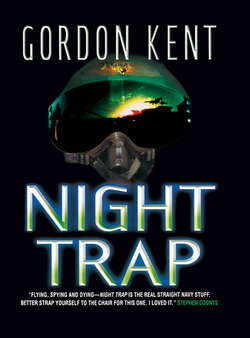Читать книгу Night Trap - Gordon Kent, Gordon Kent - Страница 31
2120 Zulu. The Iranian Coast.
ОглавлениеIt was dark along the Iranian coast. The noncom they called Franci was not a very willing soldier, but he was an able one. In fact, he made the decisions at his SAM battery, although the orders were given by an officer who had less real knowledge but a more reliable history.
Now, Franci was chewing his moustache and smoking. They had been ordered up to full alert every night for two weeks—missiles on the rails, radar warm and ready. The imams apparently believed the American demons were coming. Franci supposed they were—he had lived in America, knew the almost casual belief in exercising power. The reverence for the gunslinger, he thought.
So he sat in the command trailer and waited.
The box had arrived five nights before. It had been bolted on the main radar dish. The zealot who had brought it had said that it would see the infidels as they crossed into Iranian air space. This was a story for children, in Franci’s view; six years at the University of Buffalo, from which he had been forced home by threats to his family, convinced him that the box must somehow turn the dish into a (probably inefficient) passive detector. The zealot had sworn that when the blue-green light went on in the command van, the Americans would be coming.
And so they would be, Franci mused.
He had also seen the Revolutionary Guards bring in a missile launcher of their own, now standing well clear of the SAM battery. As usual, it looked like industrial scrap held together with string. The RGs loved toys, he thought—no, “Correction,” as his American friends used to say, all Iranians loved toys—look at the outboard boats mounted with machine guns, the taxi-mounted rocket launchers. Gadgets for a preindustrial theocracy.
The missile, when he had been allowed to glance at it uncovered, had looked to him like an ancient I-Hawk with the front end tarted up. The electrical engineer in him had cringed. It had looked like trouble to him. Big Trouble. Things meant to go bang were always big trouble for somebody unless they were properly designed and engineered.
So he had approached his own officer about it, although coming at the matter circumspectly, after the fashion of a stray dog approaching a kindly voice—sideways and ready for a kick.
“Ha, Rasi, and how is your wife?” he had said.
“She is well, soldier of the servants of God. Soldier, I am not to be addressed by name by you with, ah, hmm, them here.” He had nodded toward the shrouded missile, as if it represented the Revolutionary Guards in all their power. And their narrow-mindedness.
“Rasi, may your name be blessed,” Franci had said, not able entirely to suppress irony, “friend of all soldiers, I abase myself,” and he had started to kneel, causing the officer to wince and urge him to his feet. Enough was enough, obviously.
However, they had got to the real subject. “These Revolutionary Guards,” Franci had said. He had nodded toward the missile. “The Hour is almost upon us, and their creation is, um, in the sun.”
“What? Hour? What hour?”
Franci had got excited. He could deal with idiots only so long. “The Hour! Are you incapable? The Hour when our camouflage is supposed to be up! When everything must be covered! When—!” He had swallowed, flapped his arms up and down and slapped his sides. Then, more calmly, “When Tehran tell us we must be invisible to the eyes the Americans have put in the heavens to circle the earth.”
“You go far beyond yourself to shout at me. This is not proper. I will note it. Somewhere.” The officer had pulled at his open collar as if he wished for a more formal, more dignified uniform. “The Guard take care of themselves. Maybe they have their own camouflage. We do not tell them what to do. They are the Guard!”
Franci suspected they were shepherds who couldn’t read a word of the Koran, but he didn’t dare say so. Instead, he had said with the measured slowness of a man talking to a child, “They will give us away. They will give away the missile we are not supposed to see. They will get us all killed.”
“It is the will of God.”
Franci had sighed. He had not quite dared to say that the will of spy satellites worked no matter what God—or at least the Revolutionary Guard—might say.
So now, tonight, he sat in the command trailer and smoked his fifteenth Marlboro and watched the blue-green light that was supposed to come on when the Americans arrived.
And what would happen when it did?
